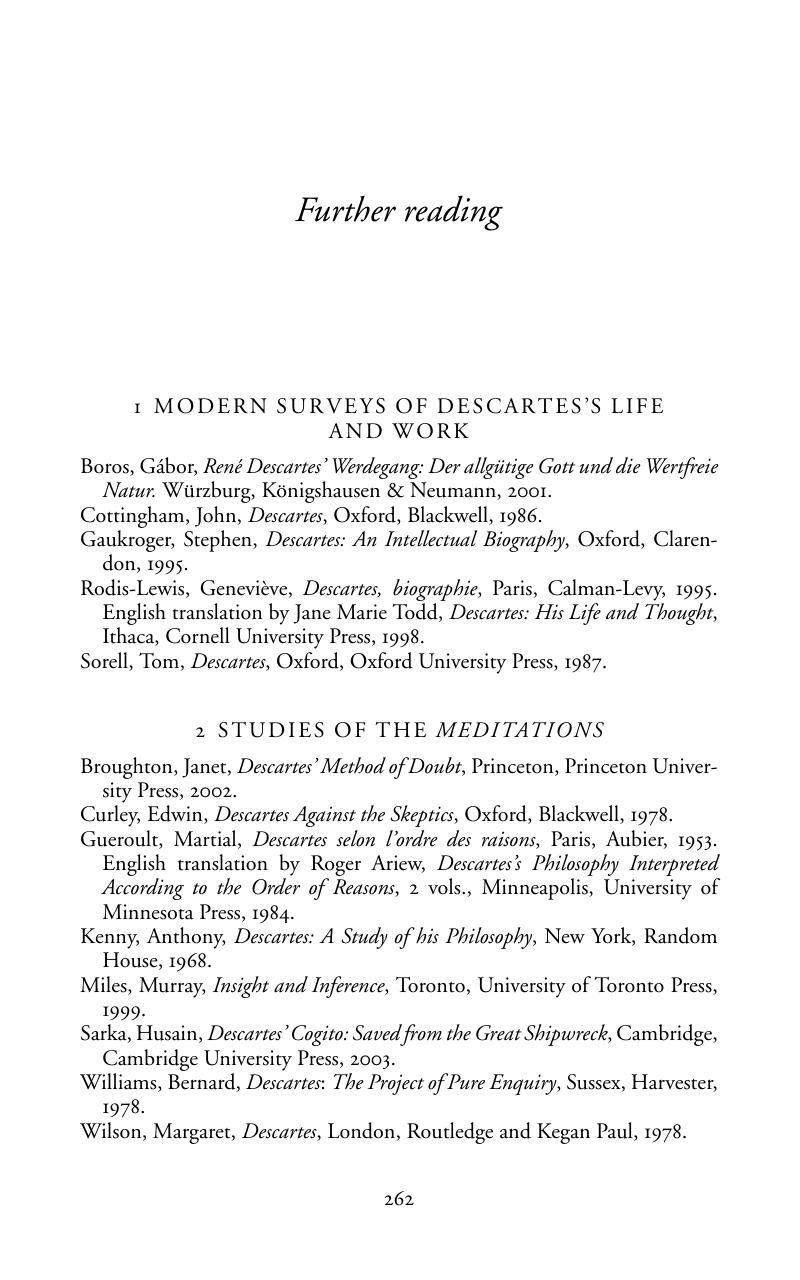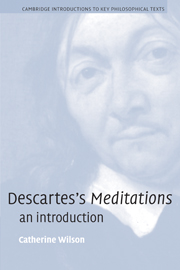Book contents
- Frontmatter
- Contents
- List of figures
- Introduction: About the Meditations
- 1 The situation of the Meditator is described and his desire to demolish everything and begin again is explored, while the Reader is introduced to some basic philosophical concepts
- 2 Meditation One : The possibility of a malevolent Demon is raised and the Meditator resolves to doubt everything he can possibly doubt
- 3 Meditation Two : The Meditator discovers an indubitable proposition and continues with an investigation into her ideas of herself and her ideas of corporeal things
- 4 Meditation Three (I) : The Meditator discovers how to distinguish true from false propositions by reference to the clarity and distinctness of his ideas and considers whether God is merely a subjective idea
- 5 Meditation Three (II) : The Meditator finds that he can reach a perfect God in his thoughts and that this God cannot perpetrate fraud and deception and cannot be a Demon
- 6 Meditation Four (I) : The Meditator broods on her epistemological and moral errors and deficiencies and discovers the true power of her will and its spontaneous attraction to truth and goodness
- 7 Meditation Four (II) : The Meditator diagnoses the cause of her epistemological and moral errors, adds an error-prevention rule to her knowledge-set, and confirms that God is truly benevolent
- 8 Meditation Five : The Meditator reflects on his experiences of mathematical and abstract concepts and arrives at a proof of God's existence
- 9 Meditation Six (I) : The Meditator determines that he is apparently attached to a particular human body. His mind and this putative body are nevertheless distinct and separable, so that immortality is possible even if bodies in general are perishable
- 10 Meditation Six (II) : The Meditator establishes that extramental corporeal things definitely exist, confirms that she has a personal body to which she is united, and learns that neither her sensations nor her perceptions resemble their causes in the external world
- 11 Meditation Six (III) : The Meditator learns how her body is organized, and discovers why her illnesses, like her errors, suggest that God is benevolent, and determines that she can proceed confidently in all the sciences
- 12 Descartes in context
- Appendix: the Objectors
- Glossary
- Further reading
- Index
- References
Further reading
Published online by Cambridge University Press: 05 June 2012
- Frontmatter
- Contents
- List of figures
- Introduction: About the Meditations
- 1 The situation of the Meditator is described and his desire to demolish everything and begin again is explored, while the Reader is introduced to some basic philosophical concepts
- 2 Meditation One : The possibility of a malevolent Demon is raised and the Meditator resolves to doubt everything he can possibly doubt
- 3 Meditation Two : The Meditator discovers an indubitable proposition and continues with an investigation into her ideas of herself and her ideas of corporeal things
- 4 Meditation Three (I) : The Meditator discovers how to distinguish true from false propositions by reference to the clarity and distinctness of his ideas and considers whether God is merely a subjective idea
- 5 Meditation Three (II) : The Meditator finds that he can reach a perfect God in his thoughts and that this God cannot perpetrate fraud and deception and cannot be a Demon
- 6 Meditation Four (I) : The Meditator broods on her epistemological and moral errors and deficiencies and discovers the true power of her will and its spontaneous attraction to truth and goodness
- 7 Meditation Four (II) : The Meditator diagnoses the cause of her epistemological and moral errors, adds an error-prevention rule to her knowledge-set, and confirms that God is truly benevolent
- 8 Meditation Five : The Meditator reflects on his experiences of mathematical and abstract concepts and arrives at a proof of God's existence
- 9 Meditation Six (I) : The Meditator determines that he is apparently attached to a particular human body. His mind and this putative body are nevertheless distinct and separable, so that immortality is possible even if bodies in general are perishable
- 10 Meditation Six (II) : The Meditator establishes that extramental corporeal things definitely exist, confirms that she has a personal body to which she is united, and learns that neither her sensations nor her perceptions resemble their causes in the external world
- 11 Meditation Six (III) : The Meditator learns how her body is organized, and discovers why her illnesses, like her errors, suggest that God is benevolent, and determines that she can proceed confidently in all the sciences
- 12 Descartes in context
- Appendix: the Objectors
- Glossary
- Further reading
- Index
- References
Summary

- Type
- Chapter
- Information
- Descartes's MeditationsAn Introduction, pp. 262 - 265Publisher: Cambridge University PressPrint publication year: 2003

